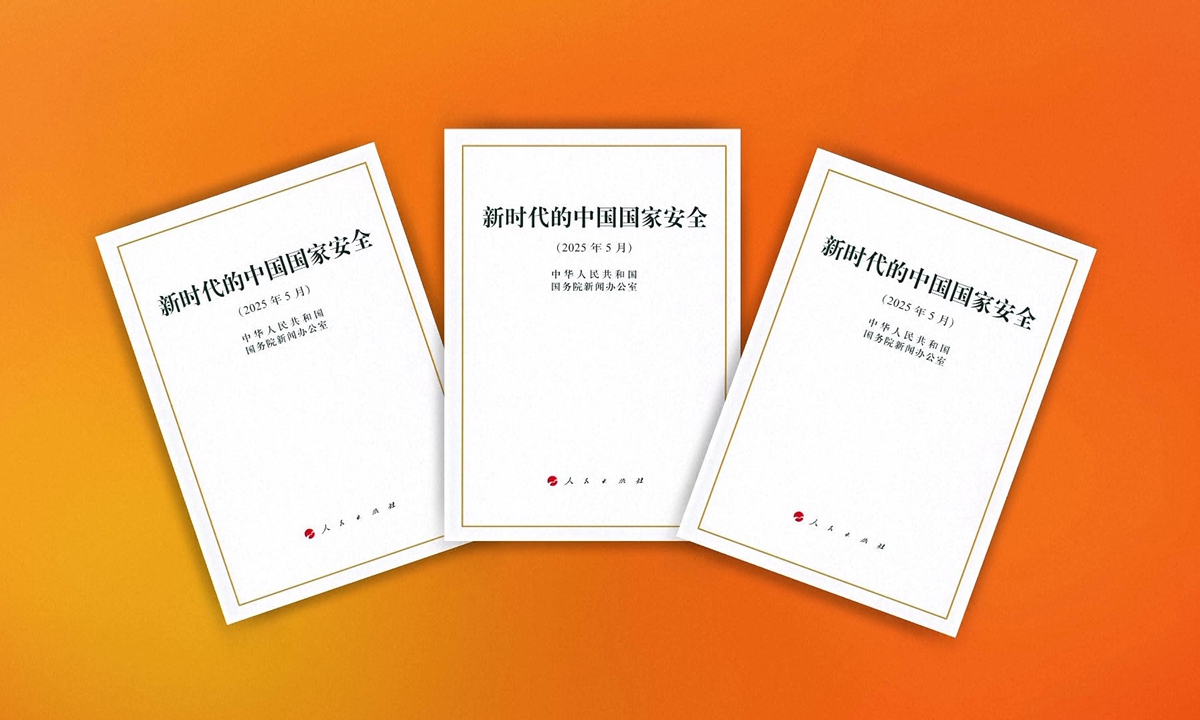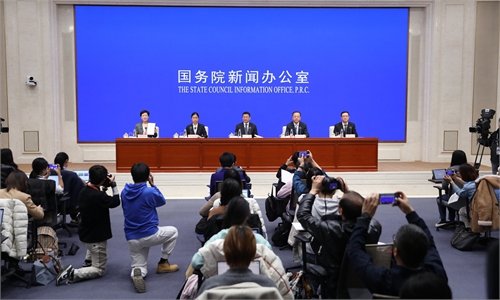
China's State Council Information Office issues the country’s first white paper on national security Photo: VCG
China's State Council Information Office on Monday issued the country's first white paper on national security. Facing a complex landscape of deepening adverse external impacts and increasing internal challenges, overall, China's national security situation has maintained stable and steady progress, as China works with Asia-Pacific nations to jointly uphold regional peace and development, injecting stability into a turbulent world, an official of the department concerned elaborated on the white paper.
China's national security in the new era is one that takes the people's security as its ultimate goal, political security as the fundamental task and national interests as the guiding principle, read the abstract of the white paper, per the Xinhua News Agency on Monday.
It is also one that serves and promotes high-quality development, supports further expansion of high-level opening-up, and operates under the rule of law. China coordinates its own security and common security, opposes the generalization of security, does not implement security coercion and does not accept threats and pressure. The country adheres to independence and self-confidence and the path of national security with Chinese characteristics, says the white paper.
It also emphasizes that China's national security in the new era will safeguard high-quality development, uphold national territorial integrity and maritime rights and interests, ensure security and reliability in emerging domains in order to prevent and mitigate various risks in the process of Chinese modernization.
In the new era, China has explicitly identified the coordination of development and security as one of the major principles of national governance, incorporating it into the overall consideration of economic and social development, according to the white paper. It stressed that China will continue to grow stronger by balancing openness and security, with its doors opening ever wider.
Song Zhongping, a Chinese expert on national security, aerospace and military affairs, told the Global Times that China's first national security white paper has clearly delineated security threats across all domains, revealing that external threats pose unprecedented challenges to our nation.
Externally, the world is entering a period of heightened turbulence. China's neighboring flashpoints, such as India-Pakistan conflicts, resurface intermittently. Also, the US-led Western bloc's provocations in China's periphery, coupled with spillover effects from conflicts like Russia-Ukraine, are creating comprehensive security pressures. Internally, non-traditional security threats including extremist infiltration, color revolution attempts, terrorism risks, as well as ethnic and religious issues, also could challenge national stability, Song said.
Amid global transformations and technological advancements, the white paper has expanded the concept of national security. While traditional concerns like territorial sovereignty and maritime rights remain vital, emerging domains such as biosecurity and space security are gaining strategic prominence.
Significantly, the document establishes that China's security paradigm encompasses not only sovereignty interests but also developmental interests. "With substantial overseas investments and cooperation projects underway, the security of these assets has become a vital manifestation of our developmental interests, and constitute a priority consideration in our national security framework," Song added.
Elaborating on the white paper, the official of the department concerned told press on Monday that the key to China's holistic approach to national security emphasizes the idea of "big security," focusing on major issues of the nation that serve to safeguard the survival and sustainable development of the country.
However, not all risks in every field are classified as national security risks, nor is China's approach about pursuing absolute security or the generalization of security. China's approach to maintaining national security has clear boundaries, which fundamentally differs from the US' tendency to generalize the concept of national security, and engage in extensive sanctions, decoupling and coercive tactics, the official said, Xinhua reported.
In response to a question regarding the US tariff issue, the official stated that China has always handled China-US relations based on the principles of mutual respect, peaceful coexistence and win-win cooperation, and is committed to the stable, healthy and sustainable development of these relations. China views the pressure from the US as a driving force, considering the challenges as a strategic opportunity to accelerate the construction of a new security framework and to advance the modernization of its national security system and capabilities.
Looking ahead, China will strengthen the rule of law in foreign affairs, improve mechanisms to counter sanctions, interference and "long-arm jurisdiction," and enrich its toolbox of countermeasures to firmly safeguard its national sovereignty, security and development interests, the official said.
China is also a proactive actor in advancing international common security. The Global Security Initiative rejects outdated concepts such as zero-sum games, absolute security and alliance-based confrontation, driving the global security governance system toward a more just and equitable direction. By the end of 2024, the initiative had garnered support and appreciation from 119 countries and international organizations and had been incorporated into 123 bilateral and multilateral political documents.
"China will always remain a steadfast force in safeguarding national interests, a just force in maintaining global peace and stability, a progressive force in upholding international fairness and justice, and a constructive force in promoting global common development. We will actively foster broader consensus for building an equal and orderly multipolar world, injecting greater certainty into a turbulent world," the official said.
China's national security in the new era is one that takes the people's security as its ultimate goal, political security as the fundamental task and national interests as the guiding principle, read the abstract of the white paper, per the Xinhua News Agency on Monday.
It is also one that serves and promotes high-quality development, supports further expansion of high-level opening-up, and operates under the rule of law. China coordinates its own security and common security, opposes the generalization of security, does not implement security coercion and does not accept threats and pressure. The country adheres to independence and self-confidence and the path of national security with Chinese characteristics, says the white paper.
It also emphasizes that China's national security in the new era will safeguard high-quality development, uphold national territorial integrity and maritime rights and interests, ensure security and reliability in emerging domains in order to prevent and mitigate various risks in the process of Chinese modernization.
In the new era, China has explicitly identified the coordination of development and security as one of the major principles of national governance, incorporating it into the overall consideration of economic and social development, according to the white paper. It stressed that China will continue to grow stronger by balancing openness and security, with its doors opening ever wider.
Song Zhongping, a Chinese expert on national security, aerospace and military affairs, told the Global Times that China's first national security white paper has clearly delineated security threats across all domains, revealing that external threats pose unprecedented challenges to our nation.
Externally, the world is entering a period of heightened turbulence. China's neighboring flashpoints, such as India-Pakistan conflicts, resurface intermittently. Also, the US-led Western bloc's provocations in China's periphery, coupled with spillover effects from conflicts like Russia-Ukraine, are creating comprehensive security pressures. Internally, non-traditional security threats including extremist infiltration, color revolution attempts, terrorism risks, as well as ethnic and religious issues, also could challenge national stability, Song said.
Amid global transformations and technological advancements, the white paper has expanded the concept of national security. While traditional concerns like territorial sovereignty and maritime rights remain vital, emerging domains such as biosecurity and space security are gaining strategic prominence.
Significantly, the document establishes that China's security paradigm encompasses not only sovereignty interests but also developmental interests. "With substantial overseas investments and cooperation projects underway, the security of these assets has become a vital manifestation of our developmental interests, and constitute a priority consideration in our national security framework," Song added.
Elaborating on the white paper, the official of the department concerned told press on Monday that the key to China's holistic approach to national security emphasizes the idea of "big security," focusing on major issues of the nation that serve to safeguard the survival and sustainable development of the country.
However, not all risks in every field are classified as national security risks, nor is China's approach about pursuing absolute security or the generalization of security. China's approach to maintaining national security has clear boundaries, which fundamentally differs from the US' tendency to generalize the concept of national security, and engage in extensive sanctions, decoupling and coercive tactics, the official said, Xinhua reported.
In response to a question regarding the US tariff issue, the official stated that China has always handled China-US relations based on the principles of mutual respect, peaceful coexistence and win-win cooperation, and is committed to the stable, healthy and sustainable development of these relations. China views the pressure from the US as a driving force, considering the challenges as a strategic opportunity to accelerate the construction of a new security framework and to advance the modernization of its national security system and capabilities.
Looking ahead, China will strengthen the rule of law in foreign affairs, improve mechanisms to counter sanctions, interference and "long-arm jurisdiction," and enrich its toolbox of countermeasures to firmly safeguard its national sovereignty, security and development interests, the official said.
China is also a proactive actor in advancing international common security. The Global Security Initiative rejects outdated concepts such as zero-sum games, absolute security and alliance-based confrontation, driving the global security governance system toward a more just and equitable direction. By the end of 2024, the initiative had garnered support and appreciation from 119 countries and international organizations and had been incorporated into 123 bilateral and multilateral political documents.
"China will always remain a steadfast force in safeguarding national interests, a just force in maintaining global peace and stability, a progressive force in upholding international fairness and justice, and a constructive force in promoting global common development. We will actively foster broader consensus for building an equal and orderly multipolar world, injecting greater certainty into a turbulent world," the official said.



